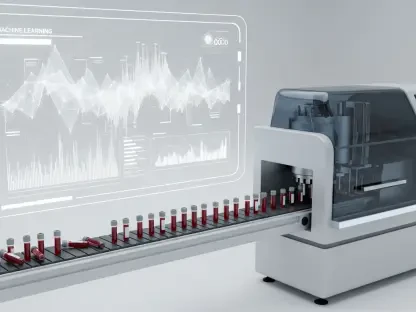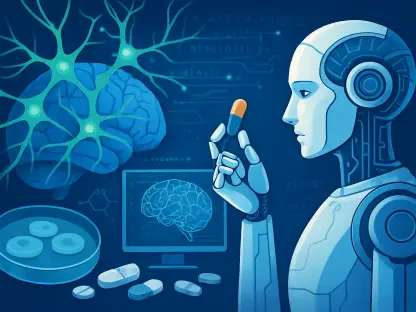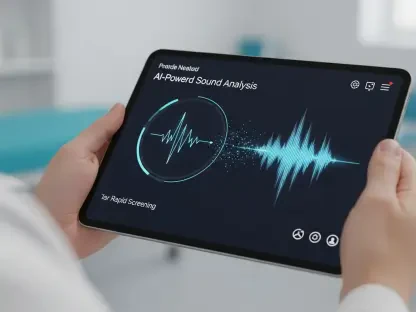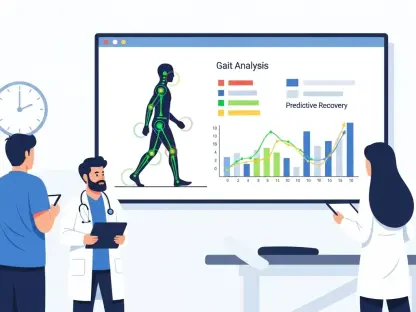The rapid advancement of artificial intelligence (AI) has made significant strides in many sectors, and the realm of healthcare is no exception. Among the promising innovations is the use of AI-powered digital twins in clinical trials, particularly those targeting complex diseases like Amyotrophic Lateral Sclerosis (ALS). This emerging technology holds the potential to transform how clinical trials are conducted, providing new avenues for faster, more precise, and cost-effective drug development. The partnership between Unlearn, a company specializing in AI-driven digital twins, and Trace Neuroscience exemplifies how integrating cutting-edge technology and medical research can improve patient outcomes and potentially revolutionize the field.
Transforming Clinical Trials with Digital Twins
Unlearn leverages machine learning to create digital twins—virtual versions of clinical trial participants—that assist researchers in predicting health outcomes before any actual patient data is used. This sophisticated approach can significantly streamline the clinical trial process. For instance, by using these digital replicas, researchers can foresee the progression of a patient’s condition under standard care or placebo conditions. The digital twins serve as a robust control group, reducing the number of participants needed for placebo trials and potentially shortening the trial duration.
Trace Neuroscience, which focuses its research on genomic therapies for neurodegenerative diseases, employs Unlearn’s Digital Twin Generator (DTG) ALS and Unlearn Platform for its ongoing Phase 1/2 clinical trials. This collaboration aims to target the UNC13A protein, closely linked with ALS progression. Through this partnership, researchers at Trace Neuroscience can simulate the disease’s progression more accurately, assess clinical endpoints, evaluate disease status at baseline, and monitor biomarkers over time. The outcome is a more refined and efficient clinical trial process, potentially leading to quicker and more robust results.
Leveraging Extensive Data Sets
The effectiveness of Unlearn’s digital twin technology hinges on its access to vast, curated datasets. The company’s DTG ALS is trained on over 13,000 longitudinal clinical records sourced from reputable databases, including APST Research, PRO-ACT, and the Northeast ALS Consortium (NEALS). These comprehensive datasets enable the digital twins to be highly accurate and tailored to individualized patient profiles. Utilizing such extensive historical data allows for smarter trial designs and more informed decision-making processes, accelerating the timeline for new treatment options reaching ALS patients.
In addition to the partnership with Trace Neuroscience, Unlearn has secured significant financial backing, which underscores the confidence in its innovative technology. Last year, Unlearn raised $50 million in Series C funding, cumulatively amounting to over $130 million. This financial influx has enabled the company to integrate even larger datasets from APST Research’s longitudinal study to enhance its DTG ALS capabilities. Furthermore, collaborations with other biotech firms like ProJenX and QurAlis Corporation signal a broader trend of employing AI-driven solutions to address the complexities of ALS clinical trials.
Future Implications and Broader Trends
The collaboration between Unlearn and Trace Neuroscience highlights a pivotal shift in clinical trial methodologies, driven by the integration of AI and genomics. By adopting digital twin technology, the clinical research landscape is poised for significant transformation. The ability to simulate disease progression and predict patient outcomes more efficiently heralds an era where trials could become smaller, faster, and more effective. This not only benefits patients who might gain earlier access to new treatments but also reduces the overall costs and resource demands typically associated with extensive clinical trials.
In a broader context, the use of digital twins in medical research exemplifies the growing trend towards personalized medicine. By focusing on individual patient profiles rather than generalized protocols, treatments can be tailored more closely to individual needs, thereby increasing the likelihood of successful outcomes. The deployment of AI in this manner marks a significant milestone in the journey towards more precise and effective healthcare solutions.
Pioneering a New Era in ALS Treatment
The rapid progress in artificial intelligence (AI) has significantly impacted various industries, including healthcare. A particularly promising advancement is the use of AI-driven digital twins in clinical trials, especially for complex diseases like Amyotrophic Lateral Sclerosis (ALS). This advanced technology offers the potential to revolutionize clinical trials by making drug development faster, more precise, and cost-effective. A noteworthy example of this innovation is the collaboration between Unlearn, a company focused on AI-based digital twins, and Trace Neuroscience. Together, they are demonstrating how the integration of cutting-edge technology and medical research can enhance patient outcomes and potentially transform the entire field. This partnership not only showcases the practical applications of AI in healthcare but also highlights the importance of interdisciplinary collaboration in pushing the boundaries of medical science. As AI technology continues to evolve, it may bring about more groundbreaking changes that benefit both patients and researchers alike.









